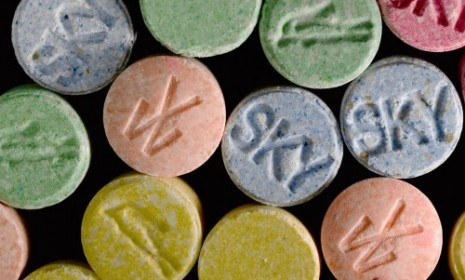Can 'ecstasy' cure PTSD?
An illegal psychedelic has promise as a cure for post-traumatic stress disorder in soldiers. Following, a quick guide to "the peace drug"

A free daily email with the biggest news stories of the day – and the best features from TheWeek.com
You are now subscribed
Your newsletter sign-up was successful
Doctors have long struggled to cure post-traumatic stress disorder (PTSD), a psychological ailment that often plagues war-torn soldiers, rape victims, and others who've lived through extremely frightening or life-threatening experiences. Now, some psychiatrists believe they've found a pill that helps. Since 2004, researchers have been testing the psychedelic party drug "ecstasy" — also known as methylenedioxymethamphetamine, or MDMA — on PTSD patients, and the results have been promising. Here, a concise guide to the drug that could cure our soldiers' nightmares. (Watch a CNN report about ecstasy and PTSD)
Why are doctors so excited about this treatment?
Because, in some patients, it nearly eliminates the problems associated with post-traumatic stress. While symptoms of PTSD vary widely from person to person, sufferers often experience recurrent nightmares, anxiety, phobias, blackouts, and uncontrollable anger. But after only a few doctor-assisted MDMA therapy sessions, a large majority of patients in the study "experienced huge drops in symptoms as measured by a standard PTSD scale," says Brian Vastag in Scientific American. Some patients said they were "completely" cured. Even years after taking MDMA, most patients "no longer meet the criteria for PTSD." And only a few suffered a relapse.
The Week
Escape your echo chamber. Get the facts behind the news, plus analysis from multiple perspectives.

Sign up for The Week's Free Newsletters
From our morning news briefing to a weekly Good News Newsletter, get the best of The Week delivered directly to your inbox.
From our morning news briefing to a weekly Good News Newsletter, get the best of The Week delivered directly to your inbox.
How does MDMA help PTSD patients?
By changing the brain's chemistry. MDMA reduces activity in the amygdala —the brain's "fear center" — and causes the brain to produce chemicals that greatly reduce fear and anxiety, and boost empathy and the desire to connect with others, experts say. This allows psychiatric therapy to have greater, more profound effects.
Is the research controversial?
There are skeptics, but the research into the therapeutic use of ecstasy is part of a broadening movement in the medical world toward the use of psychedelics like ecstasy, LSD, and psilocybin, the active ingredient in "magic mushrooms," to cure everything from cluster headaches to chronic depression. Various doctors and universities are involved, but a primary research sponsor is the Multidisciplinary Association for Psychedelic Studies (MAPS), which backed the most comprehensive study of MDMA in 35 years. The U.S. Food and Drug Administration has also been increasingly supportive, granting researchers permission to study the drugs further.
A free daily email with the biggest news stories of the day – and the best features from TheWeek.com
What are the downsides to MDMA treatment?
When taken in a controlled environment, MDMA has proved to be quite safe. But the drug remains highly illegal, and doctors warn that self-medicating is dangerous. Psychedelics can cause a wide range of health problems, including sharp increases in body temperature, liver, kidney, and cardiovascular failure, and even death. "If you're suffering from combat stress," says Ryan Gallucci at American Veteran magazine, "DO NOT TAKE ECSTASY ON YOUR OWN."
Sources: Scientific American, Washington Post, MedicineNet, U.S. Justice Dept., National Institute on Drug Abuse, American Veteran Magazine
-
 The 8 best TV shows of the 1960s
The 8 best TV shows of the 1960sThe standout shows of this decade take viewers from outer space to the Wild West
-
 Microdramas are booming
Microdramas are boomingUnder the radar Scroll to watch a whole movie
-
 The Olympic timekeepers keeping the Games on track
The Olympic timekeepers keeping the Games on trackUnder the Radar Swiss watchmaking giant Omega has been at the finish line of every Olympic Games for nearly 100 years